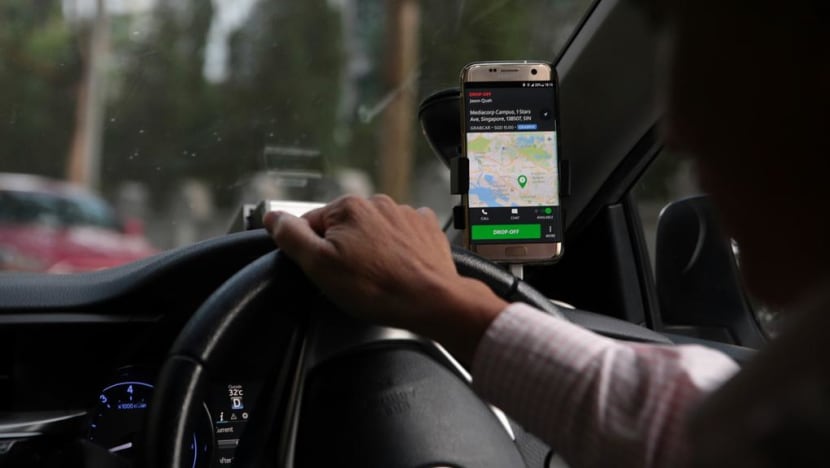Ride-hail platforms must accommodate wheelchair users, young families under new LTA licensing rules
They must give commuters the option to indicate if they need a vehicle that has a child seat or can carry a folded wheelchair from Jan 1, 2025.

File photo of a Grab driver. (Photo: TODAY)

This audio is generated by an AI tool.
SINGAPORE: From Jan 1, 2025, ride-hailing operators will have to cater to the needs of commuter groups such as wheelchair users and families with young children as part of new licensing conditions, said the Land Transport Authority (LTA) on Monday (Dec 23).
Such platforms must give commuters the option to indicate if they need a vehicle that can accommodate a folded wheelchair or one that is equipped with a child seat.
The latest changes form part of the first phase of the point-to-point (P2P) industry structure and regulatory framework review.
LTA said in September 2023 that it was undertaking a review of the framework, noting that the point-to-point sector had evolved significantly.
NEW LICENSING CONDITIONS
Under the new licensing conditions, operators must inform commuters if a matched vehicle cannot accommodate their needs, so as to allow them to cancel and rebook within the grace period if they had forgotten to indicate their requirements.
If commuters fail to indicate the need for wheelchair space or a child seat at the point of booking, drivers will be able to cancel the booking without incurring a penalty.
Grab told CNA on Monday evening that it has been working closely with LTA to "address commuters' diverse needs".
"For example, we have GrabFamily for passengers with young children. GrabFamily cars come equipped with child seats for different age groups.
"For passengers with wheelchairs, we have GrabAssist that can accommodate foldable assistive devices and GrabAssist Plus, which are vehicles equipped with ramps or hydraulic lifts."
Its GrabAssist driver-partners are also specially trained by certified care service providers on proper transfer techniques to help passengers get in and out of cars safely.
Grab added that it added a foldable mobility device transport option for passengers who require boot space for their mobility device, but do not need special assistance to get in and out of the car.
Responding to CNA's queries on Tuesday, TADA said it introduced features for specific booking requirements such as child-friendly services in November and wheelchair-friendly options in December.
All riders will be covered by personal accident coverage from Jan 1, 2025, said TADA.
The call-booking requirement will also removed for smaller street-hail operators, said LTA.
Excluding CDG Zig, which operates the call-booking service for Comfort DelGro, and CityCab, such services will no longer be a licensing requirement.
Smaller operators that opt to continue call-booking services will not be subjected to LTA’s quality of service standards or data requirements.
Operators will also be required to display a standardised set of trip information to drivers to improve transparency, making it easier for drivers to use various platforms and compare trips offered across them.
To address operational risks, LTA said operators will be required to put into place a planned response to any breach in information security, as well as establish contingency plans for incidents that can disrupt ride-hail operations.
"Operators that intend to exit the market must also provide LTA with an exit plan which should include details on the transition arrangements for affected drivers, and the settlement of outstanding financial payments to drivers and commuters," said the authority.
The exit plan has to be submitted with a minimum notice period of 120 days - twice the current notice period of 60 days.
The new measures are aimed at stabilising the taxi supply, enhancing the resilience of P2P services to mitigate the impact of any service disruption on commuters and drivers, and ensuring that such services are able to cater to a wider range of needs, said LTA.
RIDE-HAIL, STREET-HAIL, CARPOOL LICENCES
LTA granted the following companies a three-year full ride-hail service operator licence:
- Grab
- Ryde
- Tada
- Gojek
- ComfortDelGro
Grab and Ryde were also issued a three-year carpool service operator licence, while the following companies were awarded the 10-year street-hail service operator licence:
- CityCab
- ComfortDelGro
- Prime Taxi Services
- Strides Premier
- Trans-cab
Geo Lah and Trans-cab were granted a one-year provisional licence to enable them to "fine-tune their operational capabilities to meet LTA’s regulatory standards for safety and service provision" before they are considered for a full ride-hail service operator licence.
"Licensees must comply with the conditions of their licences, including meeting LTA’s safety standards and ensuring that partnership arrangements with drivers are non-exclusive in nature," said the authority.
The licences will take effect from Jan 1, 2025.
In response to CNA's queries on Geo Lah's provisional licence, LTA said the company operated as a licence-exempt operator, with fewer than 800 vehicles, during its trial period from Feb 14 to Feb 23 last year.
Geo Lah recently submitted an application for a Class 1 ride-hail service operator licence, it added.
"Upon evaluation, LTA awarded Geo Lah a one-year provisional licence to allow them time to develop their operational capabilities and refine their business model during this initial period," said the authority.
"This will allow them to better show that they are able to meet LTA’s regulatory standards, before we assess their eligibility for a full licence. This is the first time Geo-lah is awarded a ride-hail licence."
As for Trans-cab, LTA pointed out that the company is curretly licensed to provide street-hail services and ride-hail services via call booking.
The company's provisional licence will allow it to launch its own ride-hail application, said LTA.
"Notwithstanding, the P2P regulatory framework requires licensees to ensure that partnership arrangements with drivers are non-exclusive. Hence, Trans-cab’s taxi drivers will continue to have the option to drive for other ride-hail platforms," the authority added.
STREAMLINING OF TAXI DRIVERS' VOCATIONAL LICENCE TRAINING
LTA said it will also streamline the training curriculum and lower the course fees for the Taxi Driver’s Vocational Licence (TDVL) to further encourage drivers to consider taxi driving.
The total training hours required to obtain a TDVL will be reduced to 12 hours, down from 16 hours. The number of training hours required to convert a Private Hire Car Driver’s Vocational Licence (PDVL) to a TDVL will also be reduced from eight hours to five hours.
"The TDVL curriculum has been reviewed and updated to be more relevant to the demands of driving a taxi today," said LTA.
The cost to obtain a TDVL and to convert a PDVL to TDVL will also be reduced from S$275 to S$250, and S$145 to S$132.50 (before Goods and Services Tax) respectively.
LTA added that it is working on the second phase of the P2P industry structure review, with an aim to provide an update in March 2025.
"We will continue to engage industry stakeholders on other ways to improve the overall stability of P2P supply to meet evolving commuter needs and to strengthen the contestability of the P2P market so that drivers’ and commuters’ interests are protected."


















